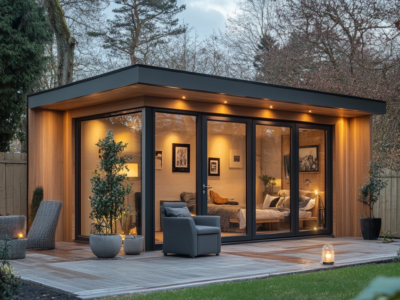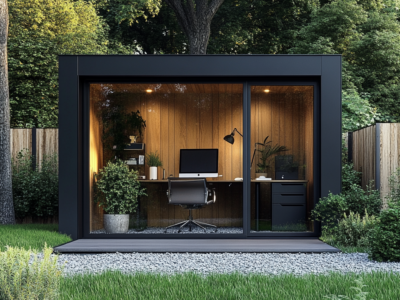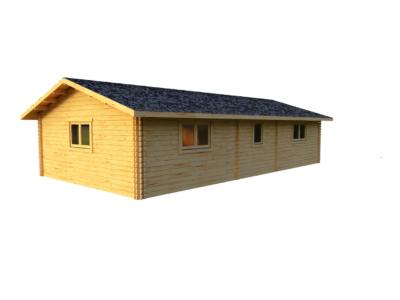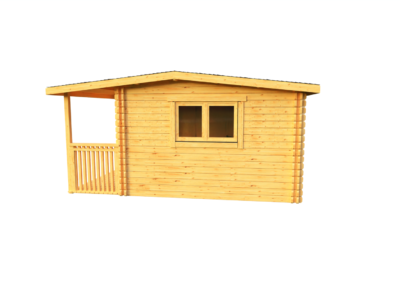As empresas de salas de jardim normalmente pré-instalam os seus edifícios com luzes e tomadas como padrão; no entanto, para obter os melhores resultados, um eletricista profissional deve completar a ligação eléctrica de acordo com os regulamentos de Trabalho de Segurança Eléctrica Parte P. Isto pode envolver a escavação de trincheiras para...
Selecting an optimal power source for your garden office will be key in creating a productive workspace. Options available to you include grid power, solar power, battery power and generator power.
Wiring
Before beginning installing electrical wiring in your garden office, it is crucial to first assess its power needs. This will allow you to decide what energy source to use – solar, grid or battery powered buildings are available – and how many sockets and switches will be needed. An electrician can assess these requirements and offer expert advice as to the optimal solution for your garden room, shed or summerhouse – they may even conduct an inspection to make sure all electrical work complies with Part P Electrical Safety Work regulations safely.
Most garden office companies pre-wire their buildings with lights and sockets (plus a consumer unit), making assembly much simpler on site. However, an armoured cable must still be run from your house to your garden office in order to connect the electricity supply – this task should be left to professionals as it involves digging a trench for underground burying of an armoured cable while adhering to earthing rules; additionally they will have to ensure your home wiring can handle an additional circuit.
Keeping in mind the use of solar-powered gabinetes de jardim requires installing photovoltaic panels onto the roof of your garden building and connecting them to inverters to convert direct current into alternating current. An electrician must then determine where these panels should be best placed for maximum efficiency and power generation; in addition to installing battery storage units that will power them when the sun doesn’t shine and how many batteries are necessary.
If you plan to connect your garden building to grid power, an electrician must install an armoured cable from the mains of your home to its consumer electrical unit in your garden building. This involves digging a trench and burying cables underground according to stringent earthing and voltage regulations, adhering to strict earthing requirements as well as checking that your wiring can accommodate an extra circuit as well as verifying fuse board capacity.
Painéis solares
Solar panels can be an excellent way to lower energy bills – particularly if there’s plenty of sunlight at your location – while also being great for the environment by providing an alternative power source. Before choosing this route however, it is essential that you assess both your location and energy needs; solar setups may incur upfront costs that should be considered against their potential benefits.
Solar panel systems installed correctly should last decades and offer an environmentally-friendly, cost-effective way of powering garden offices, with many high-quality brands offering warranties of 25-30 years. You can even connect a monitoring system so you know everything is running optimally and producing maximum power generation.
Before selecting solar panels as an energy solution for your garden office, it’s essential to understand their inner workings. Energy from your panels emerges as direct current (DC). Inverters convert this direct current into AC for use by commercial electricity grids – increasing efficiency while producing more power – measured either in Watts or Kilowatts over a given time span; overall energy output measured in Watt-hours.
Solar panels come in two varieties, mono and poly. Both varieties serve the same function, so choosing the appropriate panel depends on your aesthetics and budget needs. Mono panels tend to have more uniform hues while poly ones typically sport lighter hues (usually blue).
Based on your location, ground-mounted solar array installations may offer more advantages. Although more costly, maintenance and repair are easier. Fencing around panels should also keep livestock away from them.
Garden room electrical installations must conform with Part P electrical safety regulations, which set minimum standards to protect against fire hazards and electric shocks. While it may be possible to conduct DIY garden room projects yourself, hiring an electrician is always the better choice to ensure compliance with local and national electrical safety codes, as well as help determine what size inverter best meets your energy requirements and if a PV disconnect switch or junction box are needed.
Grid Power
Garden offices provide an ideal space for office work, leisure activities and just relaxing. Their eco-friendly features such as green roofing, water harvesting and thermal insulation help reduce their energy use and environmental impact, while connecting it to an electricity supply amplifies its functionality allowing users to utilize a wide array of devices and appliances. There are various power connection options to consider when choosing how your garden office will be powered – solar, grid power, battery power or generator power all offer distinct advantages that should be carefully considered when planning its design and setup.
As with any purchase decision, selecting the optimal garden building solution depends on factors like power needs, location and budget. A certified electrician can assess these aspects and offer advice, making sure all electrical connections meet Part P regulations for safety. Regular inspections should also be carried out to ensure everything remains up to date and secure over time.
IF YOU WANT GRIDD POWER IN YOUR GARDEN OFFICE, it requires hiring a certified electrician. He or she must run an armoured cable from your main consumer unit of your home to your shed or log cabin using stringent earthing rules and adhering to Part P electrical work regulations in order to reduce risk of fires or damages. A fuse box must also be installed within your office building so you can monitor power consumption and efficiency, identifying any potential issues before they become more significant problems.
Battery power provides another form of electricity backup in case of mains power outage, but requires proper configuration and testing in order to be an environmentally friendly choice. While ideal for areas prone to power outages, solar or generator power are more eco-friendly.
Generators can be an economical solution for those working remotely from home in locations prone to regular and extended power outages. Installation must be handled by an electrician certified in installing them properly as this will involve burying armoured cables underground before connecting your generator with your garden office using a transfer switch, thus guaranteeing optimal power distribution while protecting its wiring from adverse weather conditions and prolonging its lifespan.
Battery Power
Garden offices can make for an ideal and comfortable workspace when connected to an electrical source; however, there are various considerations when planning and installing one in your garden office. Solar, grid, battery or generator power sources all come with costs and regulations associated with them – also the type of equipment and appliances being used will influence power needs as will strategically placing electrical sockets throughout your garden office for maximum functionality and efficiency.
Connecting a garden office to the mains electricity requires working with a certified electrician for safety and compliance purposes. Part P Electrical Safety Regulations stipulate minimum standards for electrical work within buildings; making sure your installation abides with these rules is of utmost importance. A skilled electrician will also assess your power needs and recommend the best solution for your specific project.
Grid power connection to a shed, garden studio or log cabin often involves running an armoured cable from your home to your garden office. This may be time-consuming in rural settings and necessitates professional assistance for safety’s sake; an electrician will also be able to determine whether your existing home wiring can handle an extra circuit.
Battery power offers your garden office the advantage of continuous electricity during power outages or emergencies, making this option cost-effective compared to connecting directly to mains power; however, some planning and setup must take place. A fuse box should be installed to safeguard against voltage surges.
Additionally, you must connect your battery-powered office to a backup power system and test regularly so that if a mains failure occurs it automatically switches over to battery power instead. An experienced electrician should be able to complete this step efficiently and safely.






